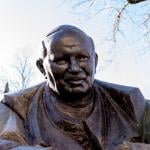KEVIN ASKS:
I have been struggling for some time now searching for the right church for myself and family. . . . Please help me sort my understanding of truth and find a place to congregate and worship. I feel as though I have been absent too long.
THE RELIGION GUY ANSWERS:
This request characterizes the church-shopping by many would-be returnees and is worth some attention. Kevin says family members share his ideas as discussed below. The Religion Guy e-mailed for further information but Kevin didn’t respond, so the following combines his original posting with some guesswork.
The family is obviously Protestant in sensibility, and one point greatly helps the process of elimination. Though Kevin has “strayed” from a Baptist boyhood he still believes children who “don’t understand both good and evil” should not be baptized, and that the ceremony is “a symbol only, as a public display of your choice to accept salvation.” So he needs a baptistic kind of church, whether or not it carries a “Baptist” label.
Further narrowing the field, Pentecostal and Charismatic churches mostly agree with Kevin about baptism but they’re out because, though he thinks speaking in tongues is “possible,” he dislikes “the way it is displayed today.” He didn’t mention any interest in African-American solidarity and culture so we’ll assume the National Baptist denominations wouldn’t be his preference. The posting didn’t say whether he cares about a church’s “worship style,” socio-political involvements, or policy on U.S. Protestants’ troublesome gay issue.
Kevin believes that “prayer works” and that we “can have a relationship with God.” But The Religion Guy figures he’d be uncomfortable in conservative groups like the Southern Baptist Convention, Converge Worldwide (formerly Baptist General Conference), or CBAmerica (formerly Conservative Baptist Association). That’s evident in his assertion that “Christ is the son of God” but “not God,” as opposed to the historic Christian teaching of the full deity of Jesus Christ.
Also, “I believe that the Bible’s message is mostly intact. I fear that time and influence have made slight but powerful changes. But I believe the Bible to be the inspired word of God through man, to be used as a tool for life and salvation.” That sidesteps the “inerrancy” or “infallibility” of the Bible as preached by Baptist conservatives.
Kevin accepts Christ’s Second Coming “in the sense that Christian faith will overcome sin and the devil. I do not think we are all intended to go to heaven. I believe that God created this world and universe for us to live without sin, and I believe it will come back to that, but with a king since we don’t seem to be able to do it ourselves. Christ will rule over us.”
Thus we see an individualistic blend of traditional and liberal concepts that remains identifiably Christian. Kevin is fortunate to be living in the U.S. with its huge variety of churches to choose from. A liberal, independent local congregation could provide a snug fit with this outlook, but let’s consider four nationwide denominations that welcome leeway on beliefs. (Each provides seekers online directories of local congregations).
The oldest, largest, and most conservative of these options is American Baptist Churches USA, based in King of Prussia, Pennsylvania, with 5,200 congregations. (Full disclosure: The Religion Guy was a member till age 29.) This group’s roots go back to the 1639 adult re-baptism of Rhode Island founder Roger Williams and his pioneering advocacy of church-state separation. The denomination’s current “Identity Statement” proclaims, “American Baptists worship the triune God of the Bible, who is eternally one God in three persons. This one, true God is most clearly revealed to us in the incarnate Son, Jesus Christ our Lord.” It calls the Bible “the divinely inspired Word of God, the final written authority and trustworthy for faith and practice.” These and other tenets might sound too orthodox, but the document doesn’t bind individuals and in actuality local congregations range from evangelical to very liberal.
Moving leftward, there’s the Indianapolis-based Christian Church (Disciples of Christ) with 3,700 congregations, known for celebrating Communion each Sunday. It’s the smallest and most liberal of three branches that grew from the Campbell-Stone “restoration movement” of the early 19th Century. Though not Baptist in name it agrees with Kevin on “believer’s baptism” and the rite as symbol, not sacrament. The Disciples’ non-binding “Principles of Identity” state that “Jesus is the Christ, the Son of the Living God” and the “Lord and Savior of the world,” pointedly adding that the denomination requires “nothing more — and nothing less — as a basis of our life together.” It endorses “the centrality of scripture” but explains “each person has the freedom” to study it. The Disciples closely associate with the equally liberal United Church of Christ, which is no option since it practices infant baptism.
Kevin didn’t say where he lives. But if it’s in the Southern Baptists’ heartland he’ll find relatively few ABCUSA or Disciples congregations to choose from. That brings us to two further options around the Southeast that are also present nationwide:
The Cooperative Baptist Fellowship of Decatur, Georgia, formed in 1991, is a loose quasi-denomination of 1,800 congregations that either quit the Southern Baptists or nominally stayed within that group but are dissatisfied. The Fellowship affirms “the freedom and responsibility of every person to relate directly to God without the imposition of creed or the control of clergy,” and “the freedom and right of every Christian to interpret and apply scripture.”
Option four is the related but more militant Alliance of Baptists, with offices in Atlanta and a mere 130 congregations. They broke from the Southern Baptists in 1987 to protest “biblical inerrancy, exclusive male clergy, autocratic pastoral leadership, narrow denominationalism, piety without social and economic justice, and the violation of state/church separation freedoms.” The Alliance says its members are “of diverse sexual orientations, gender identities, theological beliefs, and ministry practices,” and it embraces liberalism on the gay issue and socio-political matters.
Make sense? Any other options Kevin should consider?












